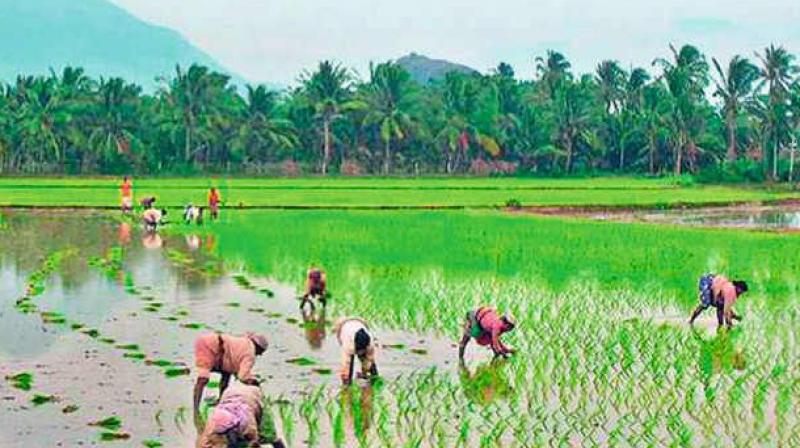Hike in MSP is political, says Farmers
Seek a state-level intervention corporation.

Hyderabad: The latest decision of the Centre to enhance minimum support price (MSP) for 14 crops has triggered a fresh debate on the cost of production and the procurement mechanism. Farmers say that the increase in MSP was a mere political decision and nothing has happened in reality, while agriculture experts agree that lack of consensus and clarity on support price is further adding to concerns of the farming community. The farming community is demanding a state-level intervention corporation for all crops.
In February last, the Centre had announced that the MSP of 14 notified kharif crops would be fixed at least 1.5 times higher than the production cost. A few days ago, the Cabinet Committee on Economic Affairs (CCEA) approved MSP of 14 kharif (summer-sown) crops. The MSP is for over 24 agricultural products; in reality it’s guaranteed only for four — cotton, paddy, wheat and sugarcane. This is on account of skewed procurement by the governments, which purchase paddy and wheat for their public distribution system (PDS) while neglecting grains like millets, pulses and oil seeds, according to the Consortium of Indian Farmers Associations (Cifa).
Mr Bojja Dasratha Rami Reddy, Cifa secretary-general, said, “We demand that the Centre and state governments establish a state-level intervention corporation to ensure the purchase of other agricultural products at MSP. The necessity of such a corporation can be gauged as the cotton price is maintained due to the existence of Cotton Corporation of India and the sugar price is ensured by the sugar mills.”
The cost of production varies from state to state depending upon on the agricultural product. From every state, an agricultural university generally submits a report on cost of production. All these reports are summarised by the Centre to arrive at a national average on cost of production, according to the Centre for Economic & Social Studies (Cess).
“From Telangana state, Prof. Jayashankar Agricultural University submits the report on cost of production. The cost that every state is following and the criterion on family, labour are being discussed now. Farmers demand that these factors should also be included,” said Mr S. Galab, director at Cess. The BJP-led NDA government at the Centre had promised to provide MSP at 50 per cent over and above the cost of production in its 2014 election manifesto. It has failed to turn this into a reality, Cifa said.
Mr Rami Reddy said, “The current proposal of raising MSP fails to take into account the cost of land lease, while computing the cost of production. This apart it fails to address the structural defects in calculating the cost of cultivation, which have been built into the terms of reference over the years.” He said simply increasing the procurement cost in rupee terms without changing the terms of reference was political expediency in an election year, which does nothing to address the issues of the farmers.
Mr Galab said, “The cost is high on paddy, chillies, cotton, etc, in Telangana state and AP, when compared to other states. So when the national average is taken, it’s less than the cost of production in the Telugu states. This makes a difference. The debate is still going on whether the Dr M.S. Swaminathan Commission report should be considered or something else. The rental value of land is also another question.”
“Small farmers are not in a position to negotiate or hold the crop till he gets a fair price. The state government should compensate additional mismatch after the Centre announces the cost of production. Every tenant farmer gets MSP, but cost of production is different for them. Small farmers mostly suffer unless the state government comes to rescue. During the YSR regime, the then state government helped the farming community beyond MSP,” he said.
